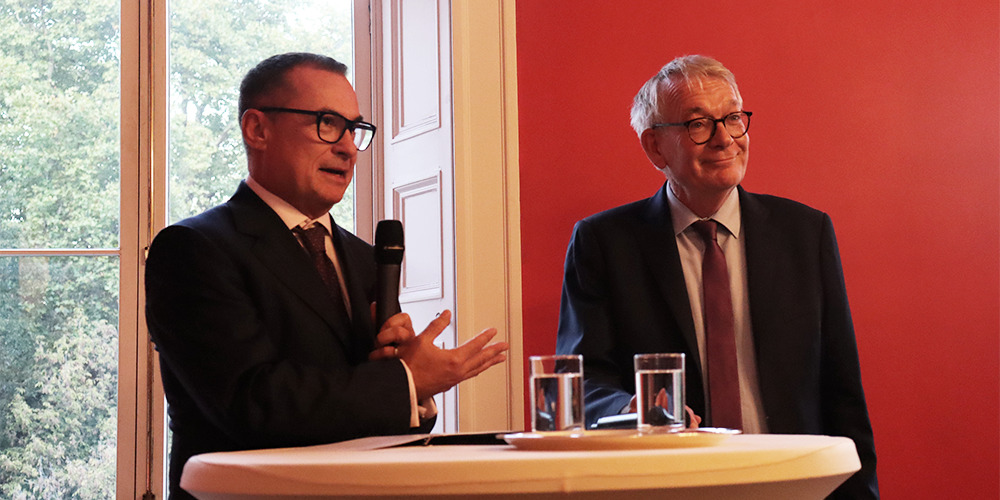European countries including the UK need to reinforce mutual trust and adopt a ‘bottom-up’ stance to strengthen co-operation, starting with defence, to overcome the problem of increasing separation from the US. That was a principal message from wide-ranging OMFIF seminars in London marking the publication of David Marsh’s new book, Can Europe Survive? The Story of a Continent in a Fractured World.
A presentation at the German embassy by Joachim Nagel, Deutsche Bundesbank president, emphasised the increasingly political nature of central banking activities, extending beyond traditional areas of monetary and financial stability. He made a strong plea for greater European independence and reduced reliance on the US in digital payments and cloud technology.
He sharply attacked US President Donald Trump’s attempts to rein in the Federal Reserve’s independence, which he termed ‘not acceptable’. Nagel called upon European leaders to loosen their normal reticence over central bank independence, saying, ‘We have to speak up here.’
Nagel’s statements rounded off a series of gatherings on 29-30 September spanning the international geoeconomic landscape. These encompassed discussions on the role of Europe, China and the US, capital market integration, the future of public finance, digital currencies and payments and the position of gold and currencies challenging the dollar’s worldwide role.
‘Coalition of the willing’
The discussion centred on Europe’s opposing hopes and fears in a new age of uncertainty dominated by Trump and Chinese and Russian leaders Xi Jinping and Vladimir Putin. There were contrasting views on some issues, such as Britain’s newfound move to common ground with the European Union, but general agreement on some key themes prevailed, such as the need for a ‘coalition of the willing’ across Europe on central policy issues.
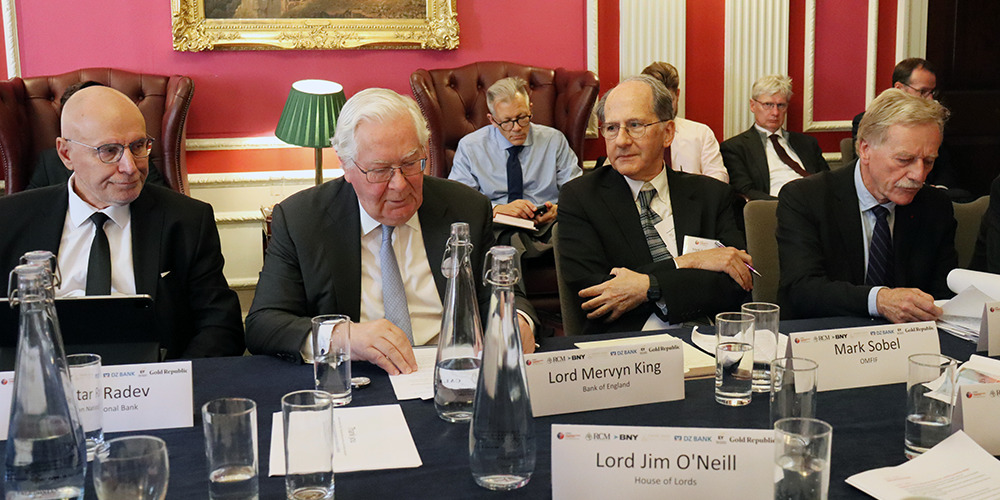
L-R: Dimitar Radev, Lord Mervyn King, Mark Sobel, Yves Mersch
Nations involved could include non-EU countries such as the UK, Norway, Switzerland and extend – particularly in military and intelligence areas – to Canada, Australia and New Zealand. This approach echoes the ‘variable geometry’ thinking favoured by some European leaders such as Jacques Delors, former European Commission president, in past years – a theme that forms a centrepiece of Marsh’s book.
Regarding the dollar’s dominance, despite the soul-searching over Trump’s policies, there was little support for the contention that the euro or the renminbi would upset the US currency’s status in the foreseeable future.
‘Gradual fragmentation’
The European economy was seen as insufficiently strong to shoulder a significantly enhanced role for the euro. ‘Strong currencies need strong economies, not vice versa,’ said one experienced euro area participant. ‘The weaker the economy is, the less able it is to bear up under heavy regulation and the more likely you are to be circumvented globally… More European integration is unlikely this decade – and Europe doesn’t have a safe asset.’
A seasoned central banker saw no likelihood that the euro would replace the dollar. ‘More likely is gradual fragmentation, with countries using alternative payment routes and local currency pairs where convenient.’
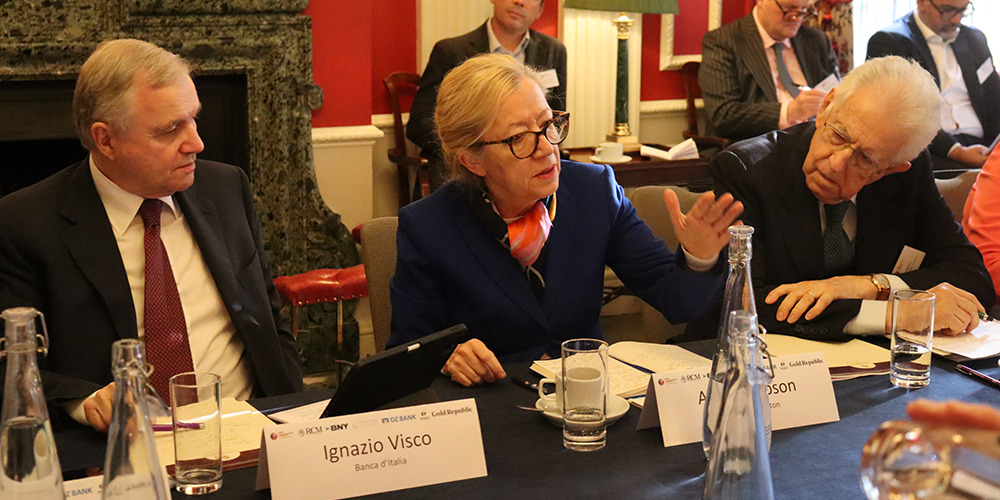
L-R: Ignazio Visco, Anne Simpson, Mario Monti
Another central banking veteran said: ‘The euro cannot be made a world currency by decree. It evolves with growth, markets and security capability.’
On the independence of the US central bank, a well-regarded US speaker decried ‘sustained political pressure’, which was eroding US institutions. ‘The risk isn’t tomorrow’s bond vigilantes, it’s long-run fiscal dominance and a gradual move towards financial repression if left unchecked.’ He pointed to the threat to international crisis mechanisms such as swap lines, should political appointees unduly interfere with co-operation during times of stress.
Geoeconomics and demographics
According to one speaker, Europe was at the mercy of political actors who were using geoeconomics as a political tool and were finding it very difficult to come to terms with the new multipolar world. This speaker believed that Trump would succeed in bringing the Fed under political control. ‘What Trump is doing to trade’, the speaker said, ‘is disturbing but nevertheless it will continue. Globalisation will not end completely – we are too far entrenched for that – but it will be eroded.’
The speaker added that Europe will be ‘resilient’ – but it would have to adapt to its low annual gross domestic product growth potential of 1%. ‘Europe is more dependent on the US than ever, especially militarily, but has a lot of economic and soft power.’
Europe’s demographic challenges raised the need for a switch to more capital-based pension schemes throughout Europe. US/UK pension systems were seen as much more flexible than European systems and able to finance intangible assets with equity. However, some expressed that demographics can be viewed as glass half-full: ‘There is a huge opportunity to attract global talent that is starting to turn away from the US.’
Structural reform
Considerable time was spent on examining Germany’s more activist fiscal stance. The relaxation of the German debt brake specifically in relation to defence, and Berlin’s setting up of a new €500bn infrastructure fund, would take time to work through to the economy. But it would eventually yield results.
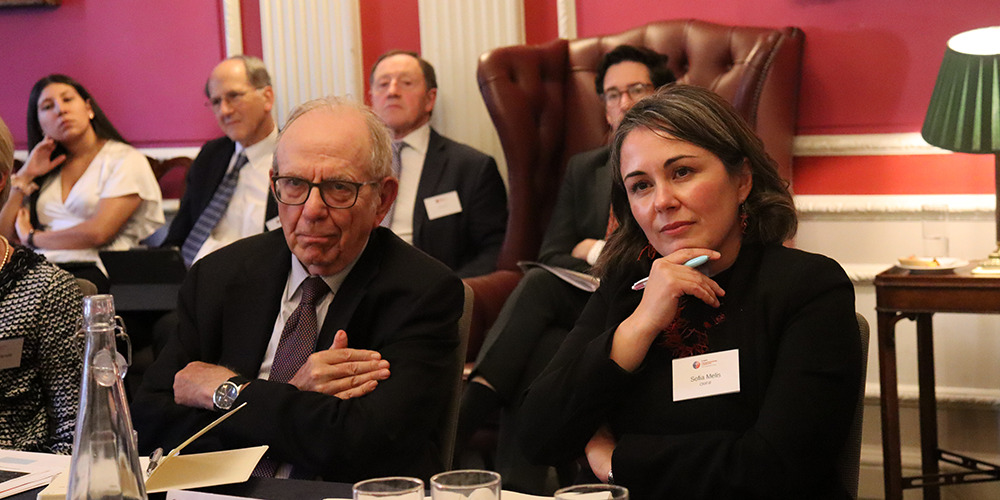
L-R: Pier Carlo Padoan, Sofia Melis
There was a need for parallel steps on structural reform – ‘two sides of the same coin’, as one delegate said. He stressed the importance of the Berlin government’s efforts to speed up planning policies to override the normal ‘public interest constraints’ on building infrastructure – similar to the measures taken after 2022 to accelerate construction of liquified natural gas terminals in north Germany. ‘It’s not a question of capability but of politics. Will Europe be brave enough to expand its fiscal stance and tackle structural problems?’
Some speakers voiced doubts about the dictum that ‘Europe requires crises to move forward’. One experienced delegate said: ‘This is not an economic crisis, it’s a governance crisis. Europe historically integrates through crises. This time, it may not. Political incentives stall banking union, capital markets union and deeper integration.’
Another delegate stressed the depth of underlying tensions. ‘This is beyond demand and supply shocks. The stress test is whether democracies can still deliver. Markets currently price a dominant positive artificial intelligence supply shock. If that falters, the shift to the negative shock narrative could be abrupt.’
He added that an ‘accident’ in financial markets might be a catalyst for action. It was better to have an earlier, smaller shock than a later, larger one – which might be a ‘catastrophe’.
In discussion of sustainability, the audience heard a robust view that the Trump administration’s negative line on combatting climate change would eventually be overridden as a result of market forces. ‘The fiduciary duty of investors isn’t something that Trump can mess with. What level of negative impact on that question is his support base willing to tolerate?’ asked one sustainability expert. This delegate added: ‘Rollbacks on climate and diversity are more like a game of chess than a full-on retreat. Physics beats politics on climate risk. Capital will price physical risks regardless of rhetoric.’
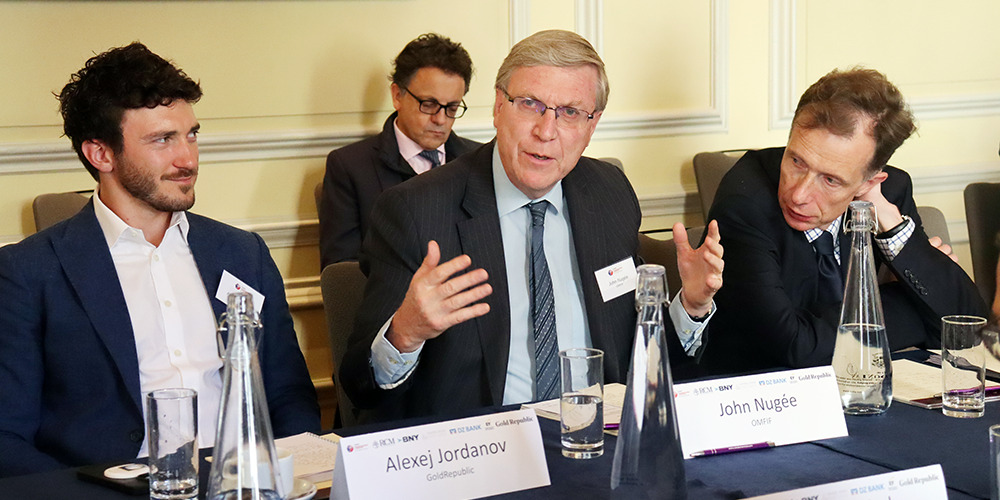
L-R: Alexej Jordanov, John Nugée and Pavel Kowalewski
A lively discussion on gold brought two contrasting yet complementary views. One speaker underlined that there was no economic justification for price of gold: ‘It’s driven by emotional and sentimental factors.’ Central banks in their actions building up reserves were following worldwide trends. Another speaker saw the issue in era-defining terms. ‘We are reaching the end of the Bretton Woods era. Smart money started buying gold 20 years ago, central banks started buying around 2008’ – which partly reflect central banks’ own credibility problem.
A core European country central banker said central banks’ demand for gold did not reflect de-dollarisation, which he termed as ‘very difficult because of a lack of alternatives’. What was happening was further reserves diversification. ‘When we buy gold, we’re paying for it in the dollar, so it’s not a de-dollarisation.’
As well as Nagel, speakers included Mario Monti, former Italian prime minister; Jörg Kukies, former German finance minister; Dimitar Radev, governor, Bulgarian National Bank; Mervyn King, former Bank of England governor; Vítor Constâncio, former European Central Bank vice president; Anne Simpson, global head of sustainability, Franklin Templeton; Kalin Anev Janse, finance director, European Stability Mechanism; Jessica Pulay, chief executive officer, UK Debt Management Office; Niels Thygesen, emeritus professor of economics, University of Copenhagen; Pier Carlo Padoan, chairman, UniCredit; Tom Scholar, chair, Santander UK; Simon McDonald, former permanent under-secretary, Foreign, Commonwealth and Development Office; Ignazio Visco, former Banca d’Italia governor; Peter Praet and Yves Mersch, former ECB board members.
Buy Can Europe Survive? The Story of a Continent in a Fractured World now.
Interested in this topic? Subscribe to OMFIF’s newsletter for more.
